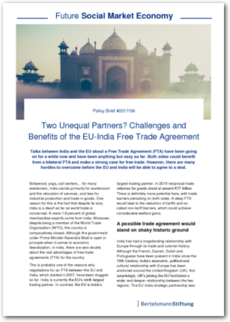Policy Brief Series Future Social Market Economy
Bertelsmann Stiftung (ed.)
Dr. Cora Jungbluth, Murali Nair, Felix Vemmer, Prof. Gabriel Felbermayr, PhD, Prof. Devashish Mitra, PhD, Dr. Rahel Aichinger, Dr. Jasmin Gröschl
Policy Brief #2017/06: Two Unequal Partners? Challenges and Benefits of the EU-India Free Trade Agreement
- Format Type
- Date of publication
- 29/05/2017
- Edition
- 1. edition
Format
-
PDF
Price
Free of charge
Description
Bollywood, Yoga, Call Center – in Germany, India stands primarily for esotericism and the relocation of services, but less for industrial production and trade in goods. One reason for this is the fact that despite its size, India is a dwarf as far as world trade is concerned. A mere 1.6 percent of global merchandise exports come from India. With a comprehensive free trade agreement between EU and India, this situation could change. In terms of gross domestic product (GDP), both sides could benefit from such an agreement, as shown by a recent study of the ifo Institute Munich on behalf of Bertelsmann Stiftung.
Based on the study’s quantitative results, this Policy Brief also assesses the political impact of an EU-India free trade agreement (FTA). The authors argue that an FTA with what in the future will be Asia’s most highly populated country would not only have a positive economic impact, though, but could also establish important groundwork for the strategic positioning of the EU in this dynamic region. India has a relatively young population and clear potential for development. Therefore, this agreement could ensure that European businesses have the opportunity to participate in future growth on the sub-continent.


 >
>


